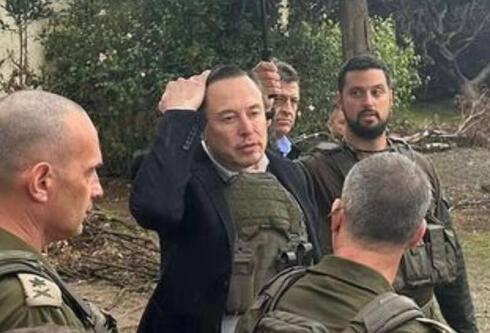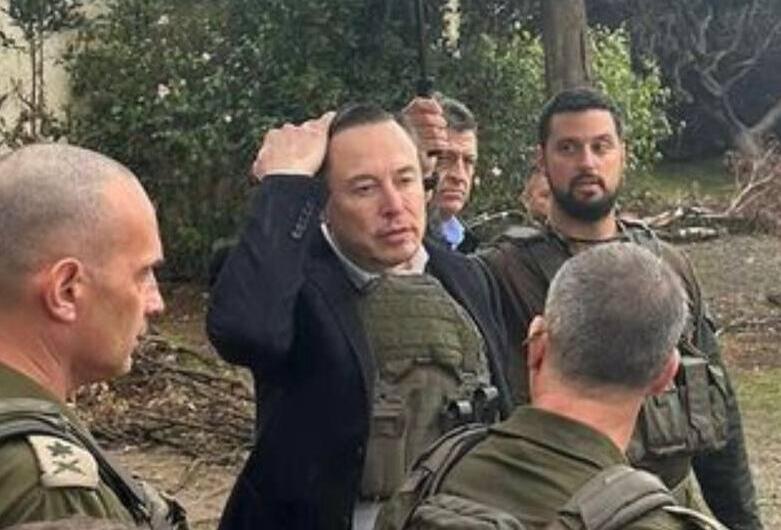
Analysis
Non X factor: Musk, Netanyahu ignore anti-Semitic discourse on X
Slogans about "a better future" were dropped continuously in the conversation between the Prime Minister and the richest man in the world following a tour of the Gaza border towns attacked by Hamas. However, any references to the toxic content on Musk's social platform X, which might have given real meaning to the meeting, were conspicuous by their absence
Is it possible to say 'no' to the richest man in the world? It’s possible, but Prime Minister Benjamin Netanyahu chose instead to take several hours out of his busy schedule on Monday to meet with businessman Elon Musk, who traveled all the way to Israel to get rid of the anti-Semitic image that stuck to him, hoping to bring advertisers back to his X social network.
Musk opened his visit with a tour of kibbutz Kfar Aza. Together with Netanyahu, he visited the house of the Liebstein family, the family of the head of the regional council who was murdered on the morning of October 7 in an exchange of fire with terrorists who infiltrated the kibbutz. After that, the two visited the house of the Itamari family, whose two parents, Lili and Ram, were also murdered on October 7. In Netanyahu's office, Musk watched the horrific video documenting the October 7 massacre.
"We need to decentralize Gaza and de-radicalize Gaza, especially in mosques and schools," Netanyahu told Musk on X Spaces (live chat on X) in which the two did not say anything specific about the problem of anti-Semitism and hate speech on X. "After that we will have to build Gaza, and I hope we can get help from our Arab friends," Netanyahu concluded. Musk hastened to add: "I would also like to help." About 130,000 listeners heard the conversation between the two as it was broadcast exclusively on Musk's social platform.
The amount of time that Netanyahu devoted to Musk, whose many anti-Semitic statements led to the exodus of advertisers from his social network, indicates a thing or two about the prime minister's priorities. Until now, Netanyahu did not spare time to attend funerals of the murdered and fallen and did not bother to meet with bereaved families or abductees who returned from Hamas captivity. The meetings with the families of the abductees also only took place due to great public pressure and in a small doses, with the PM claiming that he does not have time since he is "running a war".
"For the most part, the winner loots the loser," Musk noted on X Spaces and explained how the Treaty of Versailles signed after World War I created great discontent in Germany and resulted in important lessons that were only learned after World War II. "There was an understanding that the economy must be rebuilt and not destroyed," he said. "So they restored Germany and Japan and we had peace and prosperity." Netanyahu agreed that it was possible, but on the condition that we get rid of Hamas first. "They are actually saying that they will do it again and again and again. Therefore they must go... and then it will be possible to build a different future with the Palestinians," he concluded. These may be forward-looking things said by Netanyahu, but without substantial content. Just today it was reported that in closed conversations with Likud members, Netanyahu is working to establish two messages regarding his leadership, including the fact that he is "the only one who will prevent the establishment of a Palestinian state", a goal that U.S. President Joe Biden repeated and defined as a way to end the conflict.
Later in the visit, in which former basketball player Omri Casspi, currently the Managing Partner of venture capital fund Sheva, also participated, Musk met with Benny Gantz and with President Yitzhak Herzog and his wife Michal. The Herzogs toured the surrounding towns where they accompanied German President Frank-Walter Steinmeier, and during the visit they met their son, who was drafted at the outbreak of the war.
Herzog was also the one who brought up the problem of anti-Semitism on X to Musk, albeit in a completely superficial way. "Your visit is very important to us, because the world is changing and you are at the forefront of many technologies of humanity, and on the other hand, you saw how evil can prevail over everything. You saw how thought and hatred can lead to bloodshed," he said. The president emphasized to Musk his responsibility in a reality where "we are flooded with anti-Semitism", and added: "In a platform like the one you lead, there is a lot of hatred of Jews. We need to discuss how to fight this and make the place better and safer."
In response, Musk referred to the video of the horrors of October 7. "These people have been fed propaganda since they were little, and it's amazing what people can do when they are fed lies from childhood. They will think that the murder of innocents is a good thing. I just spoke with the prime minister, and it is clear that there are three things that need to happen when it comes to the situation in Gaza - there is no choice but to kill those who kill civilians, they will not change their minds. The second thing is to change education so that a new generation does not grow up to be murderers, and the third thing is to ensure prosperity."
This is the second meeting between Musk and Netanyahu. The first took place in September, when the Prime Minister flew to San Francisco. Netanyahu, who was not invited to the White House, showed that he still has the ability to get the attention of a person like Musk, while Musk devoted time to a high-ranking Jew, after he was again involved in an antisemitism scandal on his platform. Again, Musk comes with an anti-Semitic stain. Not only has he himself expressed support for anti-Semitic conspiracy theories, for example, that Jews hold a "dialectical hatred" for white people, but X itself has also become a space saturated with hate speech.
Just last week, the research company Media Matters found that advertisements from leading companies, including IBM, Apple, Disney and others, appeared alongside posts that promoted anti-Semitism and hatred. Some of them were even shared by Musk himself. Following the report, major brands stopped advertising on X in a move that may lead to a loss of $75 million in revenue. In response, Musk announced that chants such as "From the river to the sea, Palestine will be free" would result in the suspension of accounts. He also announced that revenue from advertising and subscriptions that are somehow related to the war in Gaza, will be donated to hospitals in Gaza and Israel, as well as to the Red Cross and the Red Crescent.
"The fact that you came here says a lot about your commitment to guaranteeing a better future," Netanyahu noted in the summary of the conversation, which until its closing did not actually say anything about the surge in anti-Semitic discourse on the platform. Musk echoed the message: "I hope for a better future for the world."
The superficiality of the discourse was jarring in the face of the fact that Musk certainly has something to say about the spread of hate speech. The man who defined himself in the past as a maximalist of freedom of expression, purchased X, then Twitter, for $44 billion. Since completing the deal about a year ago, the company has gone through massive layoffs, including the security team in charge of disinformation and content filtering. At the same time, Musk canceled the method of verified accounts. All of these led to a deterioration in the quality of the content and a surge in expressions of hate, to such an extent that not only advertisers fled, but also news organizations and politicians.
Musk, who has one of the most popular accounts on X, also distributes, as mentioned, problematic content himself. In these respects, it seems that, as in Israel, the problem starts from the top. Under these conditions, a conversation between Netanyahu, Herzog and Musk cannot lead to major changes. Or to quote the words of the Prime Minister following the Second Lebanon War: "The argument that those who made such fatal mistakes will correct themselves, is fundamentally false."














